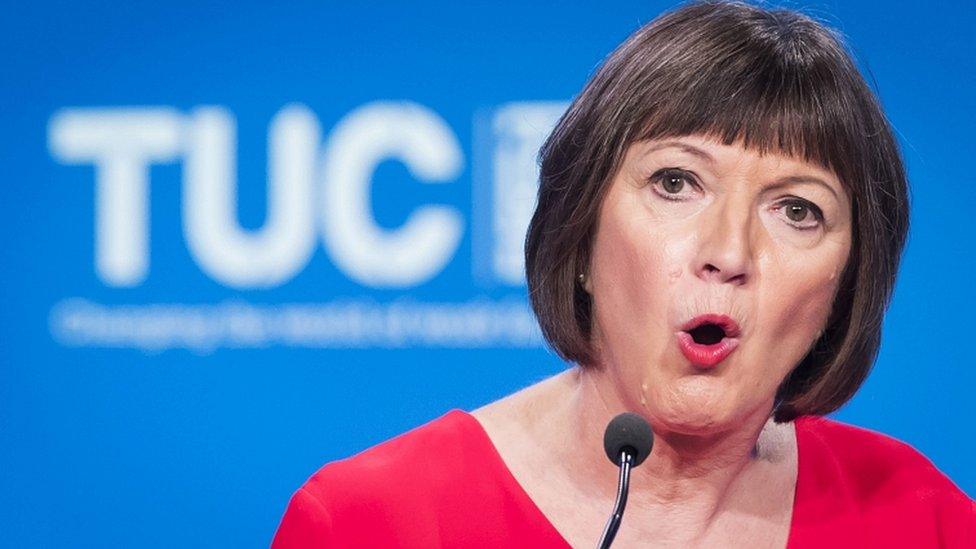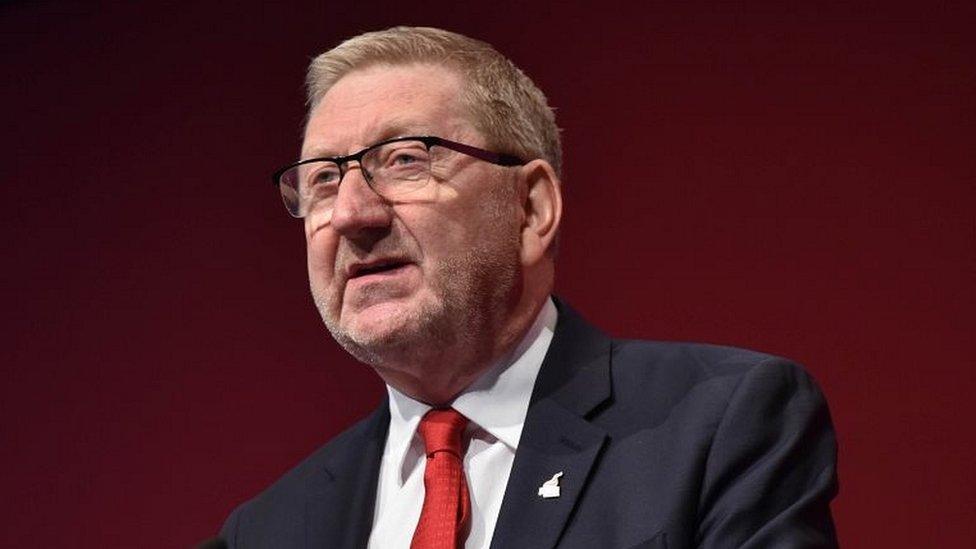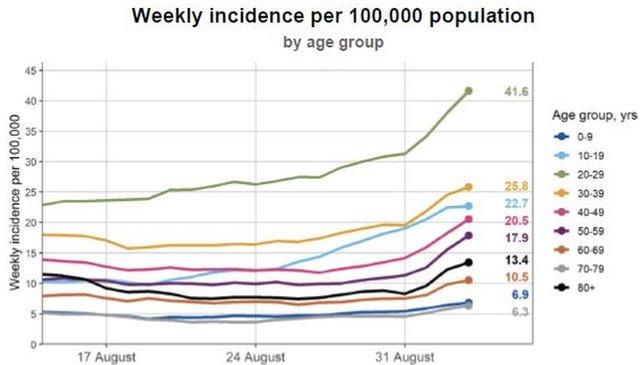Coronavirus: Young people and home workers scapegoated, says TUC boss
- Published

The government must stop "scapegoating" young people and home workers for its own failings in handling coronavirus, the leader of the TUC has said.
Frances O'Grady said ministers had been wrong to criticise the public for misconstruing "contradictory" advice.
She also praised Labour leader Sir Keir Starmer for a "strong start" but warned the party had a "mountain to climb".
Boris Johnson said on Wednesday that rules on behaviour during the pandemic had become "complicated and confusing".
Announcing a ban on gatherings of more than six people in England from next week, the prime minister added that the government was "simplifying and strengthening" its guidelines.
The TUC's annual congress - held mostly online this year because of coronavirus - starts next Monday.
It comes as the number of people in work is falling and ahead of an autumn in which businesses are expected to lay off tens of thousands more staff.
In an interview with the BBC, Ms O'Grady implored Chancellor Rishi Sunak to extend the furlough scheme beyond October.
"We're at the crossroads," she said.
"All depends on the decisions that the government takes now. We don't want to see a tsunami of job losses.
"If we ended up repeating the mistakes of the 1980s and whole towns go down, that's a real problem."
Starmer's start
Labour, the unions' traditional political ally, is smarting from its worst defeat, in terms of parliamentary seats, since 1935.
To regain power, Ms O'Grady said, leader Sir Keir Starmer must harness the "collectivist" spirit shown during the pandemic, in volunteering and the weekly applause for key workers.
"Keir has had a really strong start," she said. "You only have to look at the opinion polls to see that.
"I hear Keir talking about decency, dignity. Those are really important values, along with people looking after each other."

Len McCluskey says Unite is likely to review its donations to Labour
The comments come at a time of strained relations between the Labour leadership and Unite, the second biggest UK union.
Leader Len McCluskey, a prominent backer of Sir Keir's more left-wing predecessor Jeremy Corbyn, has promised a review of its donations to the party.
Asked whether this signified a potential schism between different political wings of Labour-backing trade unionists, Ms O'Grady said "soul-searching" was needed after such a disappointing election.
But this must be followed "by a coming together and shared understanding" of how the party, out of Downing Street from more than a decade already, can win again.
She added: "People from all parts of Labour's spectrum recognise this is a high mountain to climb."
'Moral injustice'
With millions on furlough or working from home, Ms O'Grady said, the coronavirus crisis had created a "new working class suddenly, who have been working right through this crisis, often in jobs more exposed to the virus, from refuse collectors to social care workers".
In the last week, it has been reported that the living wage rise from £8.72 to £9.21 planned for next April will be scrapped, external when the chancellor delivers his Budget this autumn.
Ms O'Grady claimed this would be "a moral injustice".

Infections in England are higher among young people than for the general population
The government is asking employees in England to return to their usual workplaces if this is deemed safe.
Meanwhile, coronavirus cases are rising, with Health Secretary Matt Hancock telling young people - whose rate of infection is higher than that of the rest of the population - to follow social distancing rules more carefully, saying: "Don't kill your gran by catching coronavirus and then passing it on."
But Ms O'Grady accused ministers of giving "confused and sometimes contradictory" advice since the beginning of lockdown.
"It doesn't seem to be joined up," she said. "What people resent is politicians and government scapegoating parts of the population when some would say they haven't been top-class in terms of their own competence and capability."

Home working is becoming a major cause of disagreement between unions and ministers
More home working should be allowed, Ms O'Grady said, despite government warnings that this will do further damage to city-centre businesses, deprived of trade from commuters.
Unions felt "frustration", after reaching agreements on the issue with employers and then having "the rug pulled from under them" by "pronouncements made from on high" by ministers, she added.
'Fallen short'
Because of coronavirus, this year's TUC congress, the traditional opening to the autumn conference season, is taking place at Congress House in central London, on 14 and 15 September, with the audience watching online.
It follows a damning report into "institutional sexism" in the GMB, the UK's third-largest union, in which bullying, misogyny, cronyism and sexual harassment were described as "endemic".
"I'm massively sad, disappointed and frankly angry that women are still experiencing this now," Ms O'Grady said, "and that we have fallen short of our values."
She added: "It's painful, but the GMB was right to commission the report. And it will be right to make sure those recommendations are implemented and acted upon."
Downing Street has been asked for a reaction to Ms O'Grady's comments.
The prime minister has insisted that maintaining furlough after 31 October would keep the economy in "suspended animation", while civil servants have been urged to return to the office as much as possible.